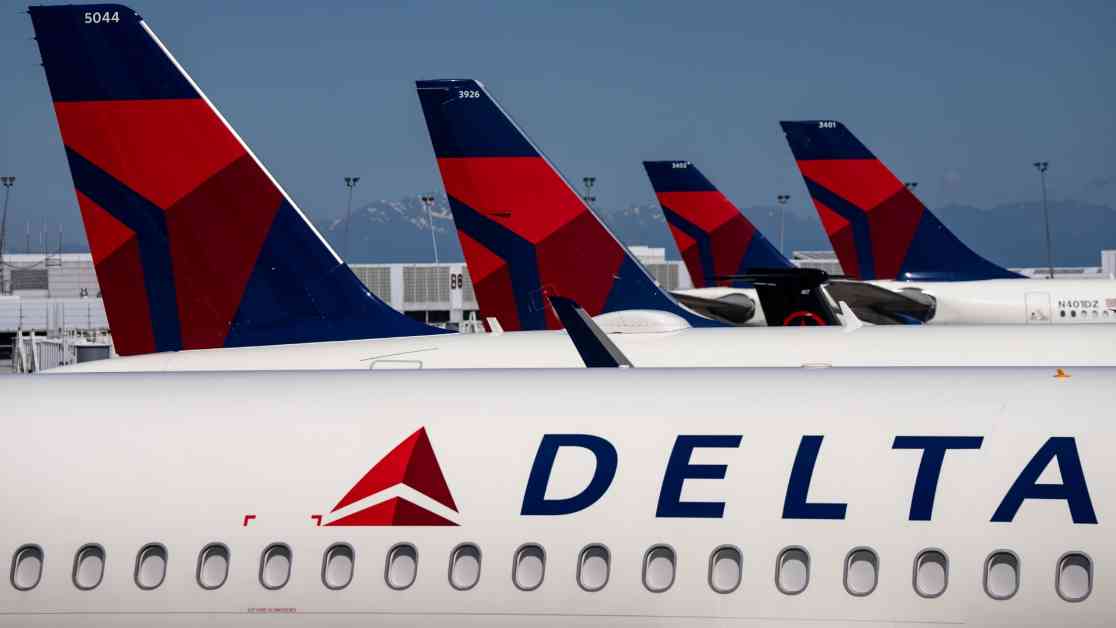Delta Air Lines Slashes Earnings Forecast Amid Weaker U.S. Demand
Delta Air Lines, a prominent player in the aviation industry, recently announced a significant adjustment to its first-quarter revenue and profit forecasts. The airline attributed this revision to a decline in domestic demand, echoing concerns about sluggish sales within the travel sector as a whole.
With planes grounded at Seattle-Tacoma International Airport, Delta revealed that its revenue for the quarter ending March 31 would see a modest increase of no more than 5% compared to the previous year. This figure represents a notable downgrade from the initial projection of 6% to 8% growth that was provided in January. Additionally, the airline lowered its adjusted earnings forecast to a range of 30 to 50 cents per share, down from the original guidance of 70 cents to $1 per share. In response to this news, Delta’s shares experienced a sharp decline, dropping over 13% in after-hours trading following a more than 5% dip during regular trading hours on Monday.
In a statement included in a securities filing, Delta acknowledged that the revised outlook was influenced by a recent decrease in consumer and corporate confidence, stemming from heightened macroeconomic uncertainty. This uncertainty has led to softness in domestic demand, impacting the airline’s financial performance. CEO Ed Bastian elaborated on these challenges during an interview on CNBC’s “Closing Bell,” emphasizing that while he does not anticipate a recession, diminished consumer confidence has led both leisure and business travelers to scale back their booking activities. Furthermore, concerns surrounding safety were exacerbated by recent aviation incidents, including a fatal midair collision involving a regional jet and an Army helicopter in Washington, D.C., as well as a non-fatal crash during a landing in Toronto.
Market Response and Industry Trends
Following the announcement, Delta’s stock performance reflected the broader market sentiment, with a noticeable downturn in share prices. This development occurred amidst a general market sell-off and ahead of the JPMorgan airline industry conference, where industry leaders were slated to provide updates on current demand patterns. Notably, Delta’s filing indicated that the demand for premium travel, international flights, and loyalty program revenue growth remained consistent with the company’s expectations.
At the same time, other major carriers such as American Airlines, Southwest Airlines, and United Airlines are also anticipated to address Wall Street analysts regarding demand trends in the industry. The aviation sector has experienced a recent decline in share prices, reflecting concerns about weakened consumer spending. This shift is particularly noteworthy given the industry’s relative resilience in the aftermath of the Covid-19 pandemic.
Expert Insights and Future Outlook
In light of these developments, industry experts are closely monitoring the situation to gauge the potential implications for the broader economy and investment landscape. As investors navigate these uncertainties, financial institutions like BlackRock are advising a strategic approach to capitalize on income-generating assets. Additionally, analysts at Piper Sandler are recommending stocks with robust fundamentals and lower risk profiles as a prudent investment strategy.
Looking ahead, the evolving trends in consumer behavior, particularly among younger demographics like Gen Z, are expected to shape the economic landscape in the coming years. Understanding these shifts will be crucial for businesses and investors seeking to navigate a rapidly changing marketplace. As the aviation industry continues to adapt to shifting demand patterns and economic uncertainties, stakeholders are bracing themselves for a period of adjustment and strategic planning.
Delta Air Lines’ decision to revise its earnings forecast serves as a poignant reminder of the interconnectedness of global markets and the profound impact of macroeconomic factors on individual industries. By remaining vigilant and responsive to changing conditions, companies can position themselves for resilience and growth in a dynamic and evolving business environment.
Please stay tuned for further updates and analysis as this situation continues to unfold.



















